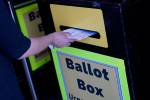Early voting
Nevada initiated early voting in 1994. Residents may cast a ballot during a two-week window prior to any given election. The feature has proven quite popular — during the 2012 general election, almost half of Nevada voters took advantage of the feature.
The practice, however, is not without its critics.
“Early voting changes what it means to vote,” argued Northwestern law professors Eugene Kontorovich and John McGinnis in an essay for Politico. “If the word ‘election’ comes to mean casting votes over a period of months, it will elide the difference between elections and polls. … Voting then becomes an incoherent summing of how various individuals feel at a series of moments, not how the nation feels at a particular moment. This weakens civic cohesiveness and it threatens to substitute raw preferences and momentary opinion for rational deliberation.”
It appears, however, that opponents of early voting had better get used to it.
In 2008, the U.S Supreme Court held that requiring voters to present identification at the polls does not violate the Constitution. But in recent weeks, federal courts have struck down voter ID laws in Wisconsin, North Carolina and Texas as overly broad and discriminatory.
Those who oppose voter ID laws — which polls show are overwhelmingly popular with most Americans — argue such statutes make it harder for poor or minority voters to participate, even when states offer free identification cards.
But consider that in North Carolina, the federal judges went far beyond simply striking down ID provisions. They also ruled that shortening the early voting period is illegal.
As part of an election reform package, North Carolina lawmakers cut early voting to 10 days from 17. This, the appeals court held, violated the federal Voting Rights Act. Similarly, Ohio, lawmakers in 2014 reduced from 35 to 28 the number of days during which state voters could cast early ballots. But a federal judge in May held the change was unconstitutional.
This is astonishing.
“Early voting didn’t even exist until Texas first adopted it in 1988,” write Hans von Spakovsky and John Fund in Tuesday’s Wall Street Journal. “The idea that it is discriminatory to have only 10 days of early voting — instead of 20 or 30 — is absurd.”
They’re correct. And what about the handful of states that don’t allow early voting? Extending the logic on display in these decisions, shouldn’t they be forced to adopt the practice? Nevada offers two weeks of early voting. But a federal judge in Ohio says that state may not cut its five-week early voting period. Does that mean Nevada’s more restrictive early voting window violates federal law?
Under the Constitution, states have wide authority to set their own election laws. To hold that they discriminate by adjusting the duration of early voting is ridiculous — and ripe for appeal.























